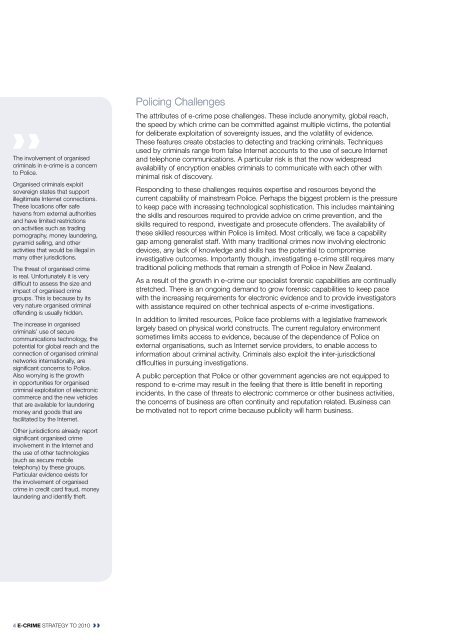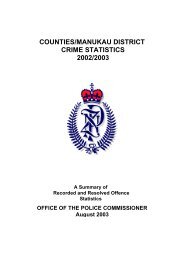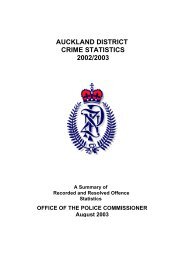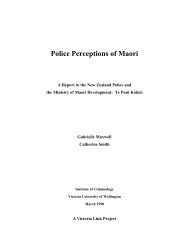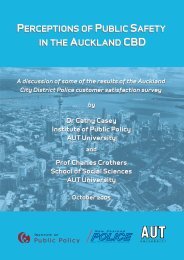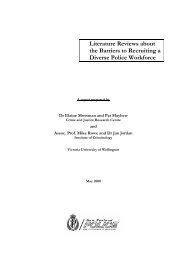Electronic Crime Strategy to 2010 - New Zealand Police
Electronic Crime Strategy to 2010 - New Zealand Police
Electronic Crime Strategy to 2010 - New Zealand Police
You also want an ePaper? Increase the reach of your titles
YUMPU automatically turns print PDFs into web optimized ePapers that Google loves.
The involvement of organised<br />
criminals in e-crime is a concern<br />
<strong>to</strong> <strong>Police</strong>.<br />
Organised criminals exploit<br />
sovereign states that support<br />
illegitimate Internet connections.<br />
These locations offer safe<br />
havens from external authorities<br />
and have limited restrictions<br />
on activities such as trading<br />
pornography, money laundering,<br />
pyramid selling, and other<br />
activities that would be illegal in<br />
many other jurisdictions.<br />
The threat of organised crime<br />
is real. Unfortunately it is very<br />
difficult <strong>to</strong> assess the size and<br />
impact of organised crime<br />
groups. This is because by its<br />
very nature organised criminal<br />
offending is usually hidden.<br />
The increase in organised<br />
criminals’ use of secure<br />
communications technology, the<br />
potential for global reach and the<br />
connection of organised criminal<br />
networks internationally, are<br />
significant concerns <strong>to</strong> <strong>Police</strong>.<br />
Also worrying is the growth<br />
in opportunities for organised<br />
criminal exploitation of electronic<br />
commerce and the new vehicles<br />
that are available for laundering<br />
money and goods that are<br />
facilitated by the Internet.<br />
Other jurisdictions already report<br />
significant organised crime<br />
involvement in the Internet and<br />
the use of other technologies<br />
(such as secure mobile<br />
telephony) by these groups.<br />
Particular evidence exists for<br />
the involvement of organised<br />
crime in credit card fraud, money<br />
laundering and identify theft.<br />
Policing Challenges<br />
The attributes of e-crime pose challenges. These include anonymity, global reach,<br />
the speed by which crime can be committed against multiple victims, the potential<br />
for deliberate exploitation of sovereignty issues, and the volatility of evidence.<br />
These features create obstacles <strong>to</strong> detecting and tracking criminals. Techniques<br />
used by criminals range from false Internet accounts <strong>to</strong> the use of secure Internet<br />
and telephone communications. A particular risk is that the now widespread<br />
availability of encryption enables criminals <strong>to</strong> communicate with each other with<br />
minimal risk of discovery.<br />
Responding <strong>to</strong> these challenges requires expertise and resources beyond the<br />
current capability of mainstream <strong>Police</strong>. Perhaps the biggest problem is the pressure<br />
<strong>to</strong> keep pace with increasing technological sophistication. This includes maintaining<br />
the skills and resources required <strong>to</strong> provide advice on crime prevention, and the<br />
skills required <strong>to</strong> respond, investigate and prosecute offenders. The availability of<br />
these skilled resources within <strong>Police</strong> is limited. Most critically, we face a capability<br />
gap among generalist staff. With many traditional crimes now involving electronic<br />
devices, any lack of knowledge and skills has the potential <strong>to</strong> compromise<br />
investigative outcomes. Importantly though, investigating e-crime still requires many<br />
traditional policing methods that remain a strength of <strong>Police</strong> in <strong>New</strong> <strong>Zealand</strong>.<br />
As a result of the growth in e-crime our specialist forensic capabilities are continually<br />
stretched. There is an ongoing demand <strong>to</strong> grow forensic capabilities <strong>to</strong> keep pace<br />
with the increasing requirements for electronic evidence and <strong>to</strong> provide investiga<strong>to</strong>rs<br />
with assistance required on other technical aspects of e-crime investigations.<br />
In addition <strong>to</strong> limited resources, <strong>Police</strong> face problems with a legislative framework<br />
largely based on physical world constructs. The current regula<strong>to</strong>ry environment<br />
sometimes limits access <strong>to</strong> evidence, because of the dependence of <strong>Police</strong> on<br />
external organisations, such as Internet service providers, <strong>to</strong> enable access <strong>to</strong><br />
information about criminal activity. Criminals also exploit the inter-jurisdictional<br />
difficulties in pursuing investigations.<br />
A public perception that <strong>Police</strong> or other government agencies are not equipped <strong>to</strong><br />
respond <strong>to</strong> e-crime may result in the feeling that there is little benefit in reporting<br />
incidents. In the case of threats <strong>to</strong> electronic commerce or other business activities,<br />
the concerns of business are often continuity and reputation related. Business can<br />
be motivated not <strong>to</strong> report crime because publicity will harm business.<br />
E-<strong>Crime</strong> <strong>Strategy</strong><br />
The e-crime strategy outlines the <strong>Police</strong> approach <strong>to</strong> combat e-crime over the next<br />
five years. The strategy aims <strong>to</strong> better position <strong>Police</strong> <strong>to</strong> deal with e-crime moving<br />
forward – the first steps <strong>to</strong>ward establishing a much larger core of specialist forensic<br />
and investigative expertise.<br />
<strong>New</strong> e-crime prevention and problem-solving approaches are required <strong>to</strong> protect<br />
potential victims and environments. To facilitate these approaches it is necessary<br />
<strong>to</strong> align intelligence systems, <strong>to</strong>ols, investigative requirements and laws <strong>to</strong> address<br />
e-crime issues.<br />
This strategy provides a framework for future planning and will give certainty <strong>to</strong><br />
partner organisations about the directions being followed <strong>to</strong> prevent and respond<br />
<strong>to</strong> e-crime.<br />
Strategic Alignment<br />
The strategy demonstrates commitment <strong>to</strong> <strong>Police</strong>’s high-level outcomes of confident,<br />
safe and secure communities, less actual crime and road trauma, fewer victims, and<br />
a world class <strong>Police</strong> service.<br />
Outcomes<br />
The desired outcomes include:<br />
Principles<br />
• a safe online environment by reducing e-crime offending and minimising<br />
the harm caused <strong>to</strong> people and organisations in <strong>New</strong> <strong>Zealand</strong>, and<br />
• improved e-crime investigative and forensic capability leading <strong>to</strong><br />
increased crime resolution<br />
The following principles guide this e-crime strategy:<br />
• <strong>Police</strong> will adopt a collaborative approach using multi-agency methods<br />
and networks.<br />
• <strong>Police</strong> will not duplicate services or capabilities offered by other<br />
agencies.<br />
• <strong>Police</strong> will adopt knowledge and intelligence-based approaches <strong>to</strong> the<br />
deployment of preventive and detective activities and resources.<br />
• <strong>Police</strong> will engage internationally <strong>to</strong> moni<strong>to</strong>r and respond <strong>to</strong> emerging<br />
risks and opportunities.<br />
The Government is targeting<br />
information and computing<br />
technology growth and<br />
innovation <strong>to</strong> “grow an inclusive,<br />
innovative economy for the<br />
benefit of all”. Achieving this<br />
goal depends on growing <strong>New</strong><br />
<strong>Zealand</strong>ers’ confidence in using<br />
new technologies safely. A safe<br />
and secure digital environment<br />
is essential <strong>to</strong> the success of the<br />
Government’s digital strategies.<br />
One strategy is e-government.<br />
This has been developed<br />
as a vision <strong>to</strong> enable all<br />
<strong>New</strong> <strong>Zealand</strong>ers <strong>to</strong> access<br />
government information and<br />
services using the Internet,<br />
telephones and other<br />
technologies.<br />
The e-government unit is<br />
focused on building electronic<br />
security through initiatives such<br />
as online authentication <strong>to</strong><br />
provide a means for people and<br />
government agencies <strong>to</strong> verify<br />
their authenticity when making<br />
electronic transactions.<br />
4 E-CRIME STRATEGY TO <strong>2010</strong> E-CRIME STRATEGY TO <strong>2010</strong> 5


